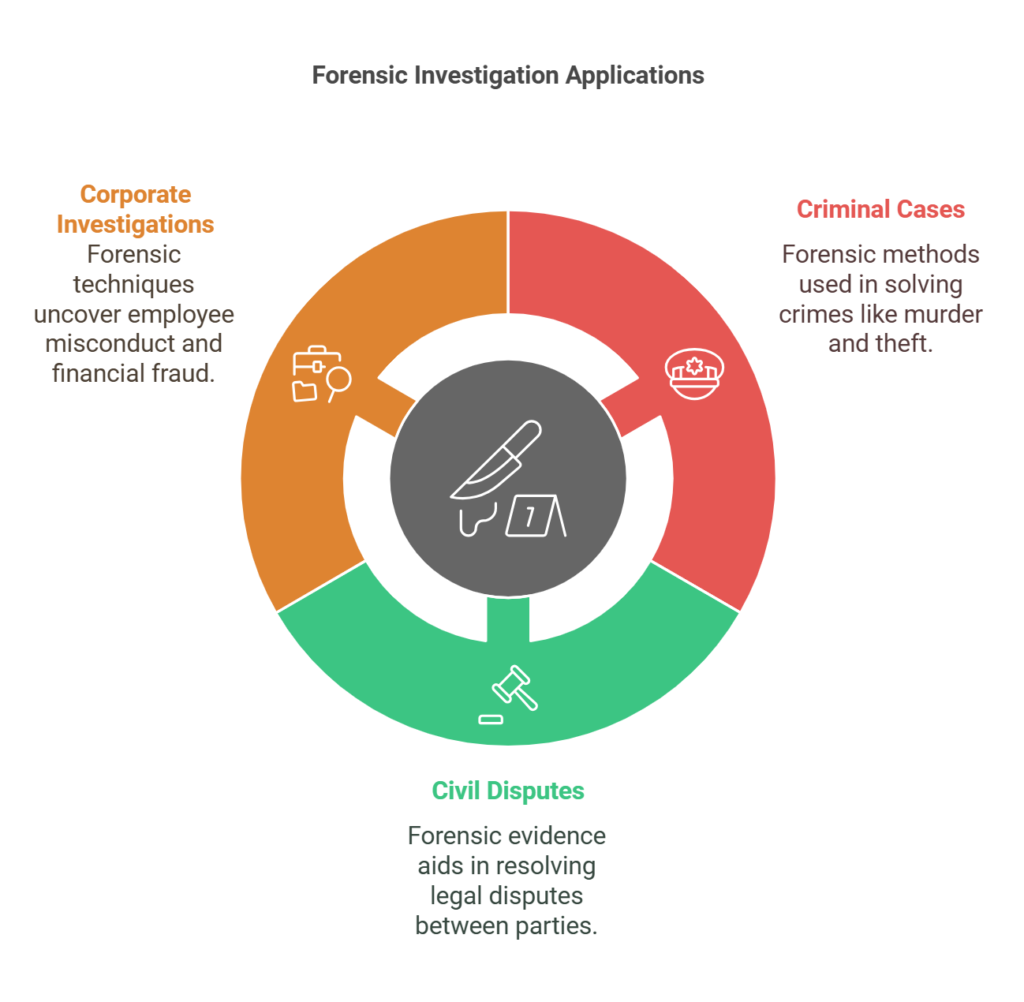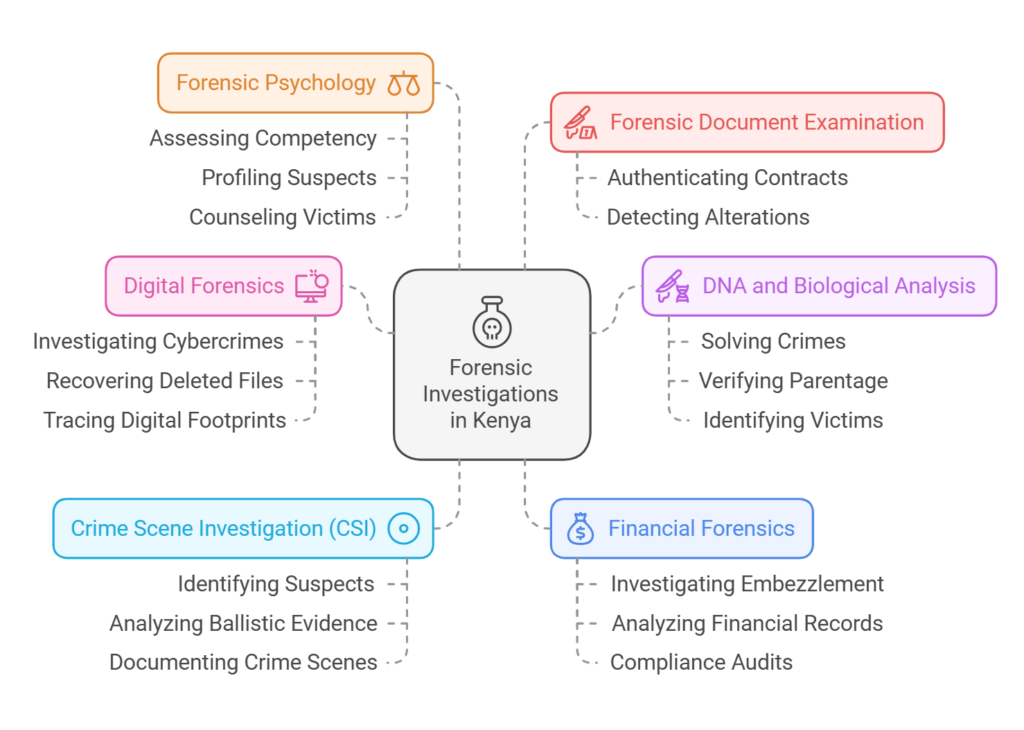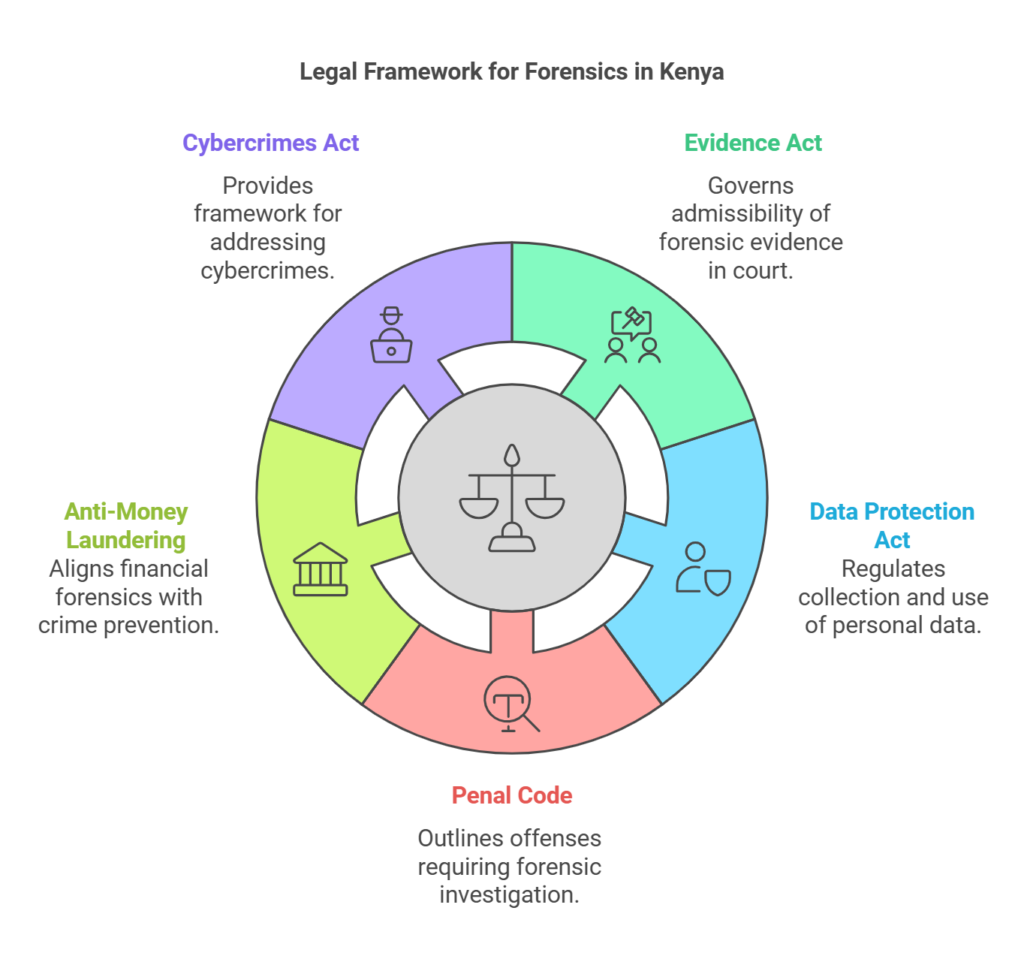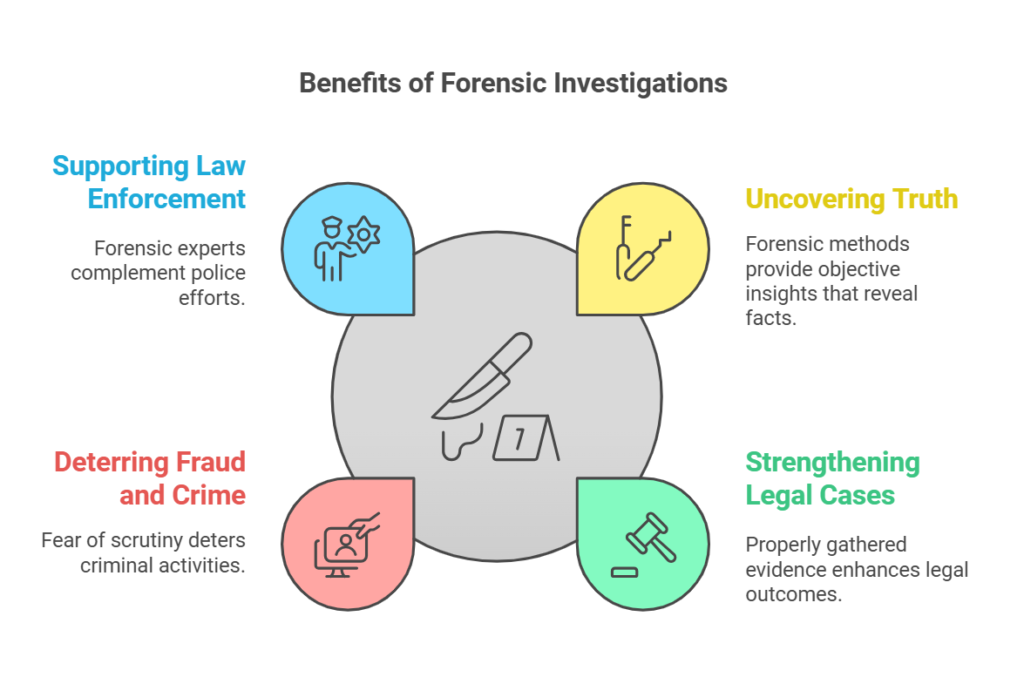Ultimate Guide to Forensic Investigations in Kenya
Forensic investigations play a crucial role in solving crimes, resolving disputes, and uncovering truths in both criminal and civil cases. In Kenya, the use of forensic science has gained momentum, with advancements in technology making investigations more accurate and reliable. Whether it’s solving complex fraud cases, analyzing digital evidence, or conducting crime scene investigations, forensic experts are indispensable in today’s justice system.
This ultimate guide delves into the world of forensic investigations in Kenya, exploring the key services, processes, legal frameworks, and how individuals, businesses, and law enforcement can benefit from forensic expertise.
What is Forensic Investigation?
Forensic investigation involves the use of scientific methods and techniques to collect, analyze, and interpret evidence for use in legal proceedings. This evidence can range from physical items like fingerprints and DNA to digital data retrieved from electronic devices.
In Kenya, forensic investigations are employed in:
- Criminal cases (e.g., murder, theft, fraud).
- Civil disputes (e.g., property claims, custody battles).
- Corporate investigations (e.g., employee misconduct, financial fraud).

Types of Forensic Investigations in Kenya
1. Digital Forensics
Digital forensics focuses on retrieving and analyzing data from electronic devices such as computers, smartphones, and servers.
Applications:
- Investigating cybercrimes such as hacking, identity theft, and online fraud.
- Recovering deleted files, emails, or messages for legal evidence.
- Tracing digital footprints to uncover the origin of cyberattacks.
2. DNA and Biological Analysis
DNA analysis is a powerful tool in identifying individuals and establishing relationships.
Applications:
- Solving crimes through biological evidence such as blood, hair, or saliva.
- Verifying parentage in paternity disputes.
- Identifying unknown victims in accidents or crimes.
3. Crime Scene Investigation (CSI)
CSI involves collecting and analyzing evidence from a crime scene to reconstruct events.
Applications:
- Identifying suspects through fingerprints, footprints, or weapon traces.
- Analyzing ballistic evidence in shooting cases.
- Documenting the crime scene for court presentation.
4. Financial Forensics
Financial forensics is critical in uncovering fraudulent activities and ensuring compliance with financial regulations.
Applications:
- Investigating embezzlement, money laundering, or tax evasion.
- Analyzing financial records to detect irregularities.
- Assisting companies in compliance audits.
5. Forensic Document Examination
This involves analyzing documents to verify authenticity and detect forgery.
Applications:
- Authenticating contracts, wills, or certificates.
- Detecting alterations, counterfeit signatures, or forged documents.
6. Forensic Psychology
Forensic psychologists evaluate the mental state of individuals involved in legal cases.
Applications:
- Assessing competency to stand trial.
- Profiling suspects to aid in criminal investigations.
- Counseling victims of crime or witnesses.

The Forensic Investigation Process in Kenya
1. Evidence Collection
The first step involves securing the scene and collecting physical or digital evidence.
- Crime scene investigators use tools like swabs, gloves, and forensic kits.
- Digital forensics experts retrieve data without altering its integrity.
2. Analysis
The collected evidence undergoes scientific analysis in a lab.
- Biological evidence is tested for DNA matches.
- Digital data is decrypted, recovered, and analyzed.
3. Interpretation
Forensic experts interpret the results and provide context for the findings.
4. Reporting
A detailed report is prepared, outlining the evidence, methods used, and conclusions drawn.
5. Court Testimony
Forensic investigators may be called upon to present their findings in court as expert witnesses.

Legal Framework Governing Forensic Investigations in Kenya
1. The Evidence Act (Cap. 80)
The Evidence Act governs the admissibility of forensic evidence in court. Forensic methods must meet legal standards to ensure credibility.
2. Data Protection Act, 2019
This law regulates the collection and use of personal data during digital forensic investigations. Investigators must obtain proper consent and protect sensitive information.
3. The Penal Code (Cap. 63)
The Penal Code outlines offenses that may require forensic investigation, such as fraud, murder, or theft.
4. Anti-Money Laundering Laws
Financial forensics often aligns with anti-money laundering regulations to investigate and prevent financial crimes.
5. The Cybercrimes and Computer Misuse Act, 2018
This Act provides a framework for addressing cybercrimes, enabling digital forensic investigators to trace and prosecute offenders.

Benefits of Forensic Investigations
- Uncovering the Truth: Forensic methods provide objective, science-based insights that reveal facts.
- Strengthening Legal Cases: Properly gathered forensic evidence enhances the chances of a favorable legal outcome.
- Deterring Fraud and Crime: The fear of forensic scrutiny deters individuals from committing offenses.
- Supporting Law Enforcement: Forensic experts complement police efforts in solving complex cases.

Challenges Facing Forensic Investigations in Kenya
1. Limited Resources
Many forensic labs lack advanced equipment, slowing down investigations.
2. Skills Gap
Kenya has a shortage of highly trained forensic experts, leading to delays in resolving cases.
3. Legal and Bureaucratic Hurdles
The legal process can be slow, affecting the timely presentation of forensic evidence.
4. Data Privacy Concerns
Digital forensics must balance investigation needs with data privacy regulations.
How to Choose a Forensic Investigation Firm in Kenya
1. Check Credentials
Ensure the firm is licensed and employs certified forensic experts.
2. Evaluate Experience
Look for a track record of successful investigations and expertise in handling cases similar to yours.
3. Assess Technology and Resources
Choose a firm equipped with advanced tools for accurate and efficient investigations.
4. Prioritize Confidentiality
The firm should guarantee discretion and protect sensitive information.
5. Read Reviews and Testimonials
Client feedback provides insights into the firm’s reliability and professionalism.
Why Choose Ultimate Forensic Consultants?
As Kenya’s leading forensic investigation firm, Ultimate Forensic Consultants offers:
- Comprehensive Services: From digital forensics to crime scene analysis, they handle diverse cases.
- Expert Team: Their investigators are highly trained professionals with years of experience.
- State-of-the-Art Technology: They use cutting-edge tools for accurate and efficient investigations.
- Ethical Practices: Compliance with Kenyan laws and global standards ensures reliable results.
- Client-Centric Approach: They provide regular updates, confidentiality, and tailored solutions.
Future of Forensic Investigations in Kenya
The future of forensic science in Kenya is bright, driven by advancements in technology and increased awareness of its importance. Trends to watch include:
- Integration of Artificial Intelligence: AI will enhance data analysis and fraud detection.
- Expansion of Digital Forensics: With increasing cybercrimes, digital investigations will become even more critical.
- Investment in Training and Infrastructure: More resources will improve the capacity and efficiency of forensic labs.
Conclusion
Forensic investigations in Kenya are a cornerstone of justice, providing the evidence needed to solve crimes, resolve disputes, and make informed decisions. Whether you’re an individual, business, or law enforcement agency, leveraging forensic expertise ensures clarity and accountability.
For reliable and professional forensic services, Ultimate Forensic Consultants stands out as a trusted partner. With their cutting-edge technology, skilled team, and commitment to excellence, they are setting the standard for forensic investigations in Kenya.
FAQs
1. What types of cases require forensic investigations in Kenya?
Cases involving fraud, murder, cybercrimes, property disputes, and paternity issues often require forensic expertise.
2. How much do forensic investigation services cost in Kenya?
Costs vary based on the complexity of the case but typically range from KES 30,000 to KES 500,000.
3. Are forensic investigations admissible in Kenyan courts?
Yes, provided the evidence is collected and analyzed in compliance with the Evidence Act.
4. How long does a forensic investigation take?
Timelines vary depending on the case; simple investigations may take days, while complex ones can take weeks or months.
5. Can individuals request forensic services, or are they only for law enforcement?
Both individuals and organizations can hire forensic investigators for personal or professional needs.
Explore professional forensic investigations with Ultimate Forensic Consultants. Contact us today for trusted, discreet, and effective solutions.
Ultimate Guide to Forensic Investigations in Kenya Read More »
Forensic Accounting, Private Investigation